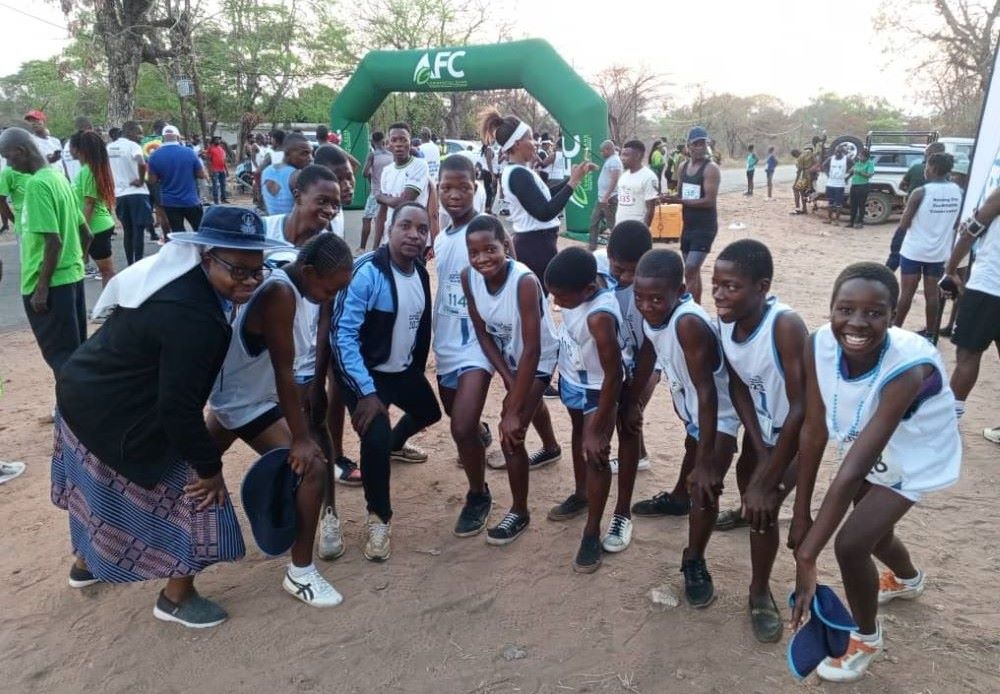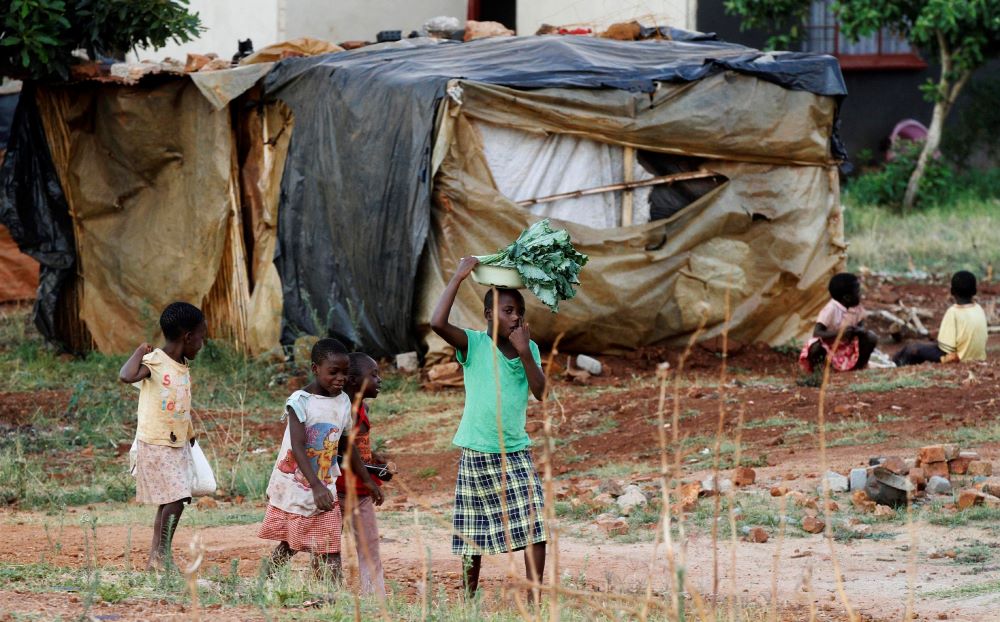
AMR Sr. Grace Moyo, a teacher at the AMR Secondary School in Lupane, Zimbabwe, poses with participants in the Binga Kasambabezi Marathon. AMR sisters organized their students to take part in the Oct. 21, 2023, race, whose theme was "Running for our wildlife conservation" as part of efforts to educate young people about the environment. (Courtesy of AMR)
Environmental and wildlife conservation in Zimbabwe has in recent years gained urgency after reports of large-scale illegal exploitation of the country's natural resources.
Despite legislation that punishes environmental violations such as sand and wildlife poaching, the country's economic hardships are driving illegal activities as residents seek to earn a living, analysts say. Responding to poisoned watering holes that have led to the deaths of hundreds of elephants, deforestation and illegal artisanal mining gangs, authorities struggle to address what they say has become a troubling environmental crisis.
Against this background, the Servants of Mary the Queen, known by their Latin abbreviation AMR (Ancillae Mariae Reginae), in Lupane, a rural district about 100 miles north of Bulawayo, Zimbabwe's second largest city, are engaging young students to raise environmental awareness.
While the government has emphasized community engagement in the conservation of natural resources, this has proven difficult as impoverished villagers take matters into their own hands, illegally exploiting protected resources for economic benefit.
Hunting and trapping game and wildlife has become common in Zimbabwe, with the country's national parks agency reporting a spike in human-wildlife conflict amid shrinking forests and animal habitat.
The AMR sisters have taken a different approach by appealing to young people to be protectors of the environment. They have turned to young learners to participate in public campaigns in the country's natural resource-rich but economically poor northwest.

Sr. Mildred Chiriseri, the AMR secondary school head (Courtesy of Mildred Chiriseri)
With thousands of people who have left school lacking formal employment, community leaders say illegal activities harmful to the environment have become the go-to way to earn a living. There are reports across the country of school children abandoning their classes to join the gold rush as illegal artisanal miners popularly known as amakorokoza. Young people engaging in these activities have been caught up in bloody turf wars that have claimed the lives of scores of illegal miners.
By targeting young people, the AMR sisters aim to stem what has become a national cause for concern, with the authorities struggling to control illegal activities harmful to the environment.
While Catholic development agencies have worked with local communities in Zimbabwe's rural areas to deal with climate-related issues, especially in agriculture, Catholic sisters are working to address the intersection of development and the environment.
Among the initiatives to promote environmental awareness, the AMR sisters who run a primary and secondary school in Lupane organized their students to take part in the Oct. 21, 2023, Binga Kasambabezi Marathon.
"What informed the decision to organize the students to take part in the Binga environmental awareness marathon was that the marathon's values align with the school's values, curriculum and long-term goals of environmental awareness," Sr. Mildred Chiriseri, the AMR secondary school head, told EarthBeat. The marathon was part of broader community engagement efforts, she added.
The Binga Kasambabezi Marathon was launched in 2017 by the government's ministry of youth, sports, arts and recreation.
The sisters participated in the 2023 marathon because they saw an urgent need to bring such wildlife and environmental awareness to their local community, especially young school children.

Zimbabwean children are pictured in a file photo carrying vegetables as they walk past a house in Harare. Poverty and unemployment drive some people to commit wildlife crimes, experts say. (CNS/Reuters/Philimon Bulawayo)
The marathon was held under the theme "Running for our wildlife conservation," and Chiriseri says this was just the beginning. The sisters look forward to participating in future marathons and engaging the AMR schools in more activities that encourage social responsibility.
Lupane and Binga lie on a wildlife belt that boasts some of the region's iconic "big five" — lion, elephant, rhinoceros, leopard and buffalo — but are marked by economic deprivation.
Binga, one the country's poorest regions, is an underdeveloped rural area on the banks of the Zambezi River. It is home to the BaTonga Indigenous people, considered the guardians of Victoria Falls, a World Heritage site.
The valley is part of the UNESCO-recognized middle Zambezi biosphere known for its rich biodiversity, which is threatened by activities such as poaching and overfishing. According to UNESCO, the valley's ecosystems, home to threatened wildlife such as the black rhino and painted wild dog can, should be protected.
"Realizing that we are stewards of creation we felt that it is our responsibility to care for and respect the environment," Chiriseri said.
"We saw the importance of teaching our learners when they are still young to recognize that the earth is a gift from God that needs to be protected," she said.
The sisters' conservation awareness efforts will promote the protection of wildlife and also help local communities derive economic benefit from natural resources.
"The response (from learners) is very positive as more learners are eager to take part in this year's marathon," Chiriseri said.
The AMR sisters have incorporated environmental awareness into the school curriculum, broadening Pope Francis' call to ecological education, ecological spirituality, community involvement and participation as outlined in his 2015 encyclical Laudato Si'.
Advertisement
"The school has an environmental club and much emphasis is put on teaching learners the importance of protecting the environment," Chiriseri said. "They are also taught the importance of recycling and growing trees and flowers to ensure the environment is protected."
As the AMR sisters continue their apostolate, they have received support from local clergy who have added their commitment to environmental awareness.
"The church is part of the campaigns to protect the environment because it is a great cause of concern," said Fr. Pritchard Shoko, a priest who blessed the students before they embarked on the marathon.
"The church by and large is always using its presence in behavior change, and the response (of young people) is promising. Some of the young men and women are actively involved in environmental awareness," Shoko told EarthBeat.
As the country's environmental challenges continue alongside the economic and political crisis, the sisters' efforts offer hope amid increasing despair.








